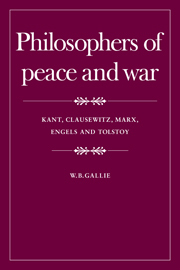4 - Marx and Engels on Revolution and War
Published online by Cambridge University Press: 24 October 2009
Summary
The influence of Clausewitz upon nineteenth- and twentieth-century military theory falls outside the scope of this study. I will only say that the accuracy with which his spirit has been seized by different military theorists seems to me to provide a useful gauge of their intelligence. Thus the elder von Moltke and General de Gaulle (to judge from Le fil de l'épée) understood Clausewitz very well from their very different points of view. By contrast Foch and Ludendorff, although quoting him freely, were apparently incapable of mastering any of his key doctrines or for that matter of following any of his sustained arguments. His main British critics, Sir Basil Liddell Hart and Major-General Fuller, adopted a somewhat insular position. Both confessed to seeing gleams of merit in Clausewitz's writings. But to the former his failure to appreciate the British way in continental warfare was unforgivable, while to the latter his addiction to philosophy was his ruin.
There was, however, one group of thinkers who, from the 1850s until the early 1920s, fully appreciated Clausewitz's contributions not only to military thought but to social thought in general – and who drew out some of their most interesting implications. These were the founding fathers of Marxism: Marx himself, despite his many other heavy intellectual preoccupations, but more particularly Engels and Lenin. The main facts about the reception of Clausewitz's ideas by the founders of Marxism have been carefully presented by the contemporary German historian, Dirk Blasius, who has shown, beyond question, not only how seriously the Marxist leaders studied On War, but how close to their own central concerns they recognised Clausewitz's teachings to have been.
- Type
- Chapter
- Information
- Philosophers of Peace and WarKant, Clausewitz, Marx, Engles and Tolstoy, pp. 66 - 99Publisher: Cambridge University PressPrint publication year: 1978
- 5
- Cited by



